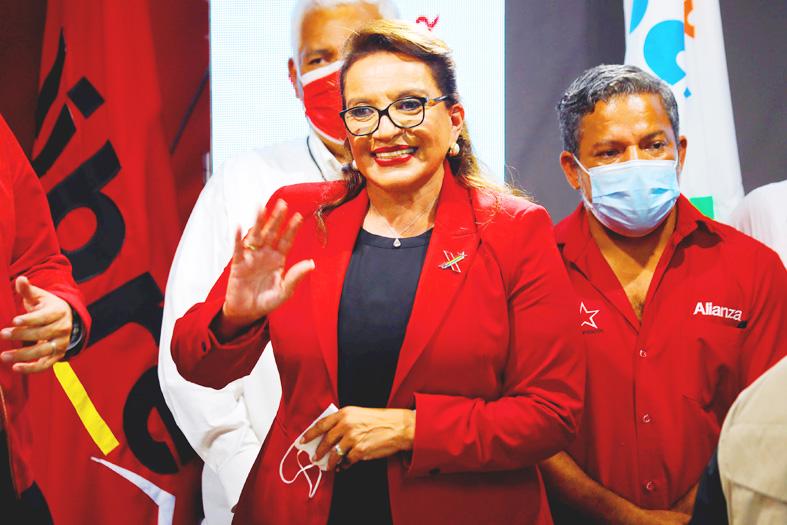Honduras’ incoming government would maintain diplomatic ties with Taiwan, two senior members of the transition team said on Friday, while a senior US administration official said that Washington was ready to “surge” economic aid to the new administration.
The news comes a day after neighboring Nicaragua switched allegiance to re-establish relations with China.
Prior to winning the Honduran presidential election on Nov. 28, Xiomara Castro of the leftist Liberty and Refoundation Party (LIBRE) said if victorious, she would open diplomatic ties with China, but her team has since backtracked on that stance.

Photo: Reuters
Gerardo Torres, LIBRE’s secretary of international relations and a member of Castro’s transition team, said that her government was not about to sever ties with Taipei.
“The new government will maintain relations with Taiwan,” he said. “President-elect Xiomara Castro has been clear, these ties will be maintained. Nobody in the party wants to enter government distancing ourselves from the United States.”
Nevertheless, another of the transition team members, Rodolfo Pastor, kept open the possibility that Honduras would recognize China, calling it a “new superpower” and saying that the Central American country was studying the matter.
Pastor said that Castro wanted to diversify Honduras’ international relations, while emphasizing that there would be “no imminent change” in the relationship with Taiwan as there had been in Nicaragua.
Honduras is eager to work with the US on stamping out the corruption that fuels emigration north, Pastor said, adding that Castro and US President Joe Biden’s administration wanted to tackle the root causes of migration.
Castro’s government would work to maintain good relations with Washington, provided they were based on mutual respect and sovereignty, Pastor said.
Looking ahead, Pastor said it was important for Honduras to find a way of reducing its debt burden so that it could invest in public infrastructure such as hospitals and schools.
Meanwhile, Washington has continued to make the case to Honduras and other countries in the Americas that recognize Taiwan to maintain those ties, and has warned them about China’s intentions and “non-transparent” investment strategy in the region, the US official said, speaking on condition of anonymity.
The official said that while Washington was uncertain whether Castro would swat away China’s advances, initial discussions with her transition team have been very positive, including on issues such as boosting economic growth, improving governance and installing an anti-corruption body.
The US is open to sending more financial help to aid Castro on her priority areas as part of broader efforts to show relations with the US are more beneficial to Tegucigalpa than ties with China, the they said.
“I think we can surge resources there, and some of that will be through development resources,” the official said, adding that allies such as Taiwan, Japan and South Korea could help with accelerating private-sector growth.

Tropical Storm Gaemi strengthened into a typhoon at 2pm yesterday, and could make landfall in Yilan County tomorrow, the Central Weather Administration (CWA) said yesterday. The agency was scheduled to issue a sea warning at 11:30pm yesterday, and could issue a land warning later today. Gaemi was moving north-northwest at 4kph, carrying maximum sustained winds near its center of up to 118.8kph and gusts of 154.8kph. The circumference is forecast to reach eastern Taiwan tomorrow morning, with the center making landfall in Yilan County later that night before departing from the north coast, CWA weather forecaster Kuan Shin-ping (官欣平) said yesterday. Uncertainty remains and

SEA WARNING LIKELY: The storm, named Gaemi, could become a moderate typhoon on Wednesday or Thursday, with the Taipei City Government preparing for flooding A tropical depression east of the Philippines developed into a tropical storm named Gaemi at 2pm yesterday, and was moving toward eastern Taiwan, the Central Weather Administration (CWA) said. Gaemi could begin to affect Taiwan proper on Tuesday, lasting until Friday, and could develop into a moderate typhoon on Wednesday or Thursday, it said. A sea warning for Gaemi could be issued as early as Tuesday morning, it added. Gaemi, the third tropical storm in the Pacific Ocean this typhoon season, is projected to begin moving northwest today, and be closest to Taiwan on Wednesday or Thursday, the agency said. Today, there would likely

DISRUPTIONS: The high-speed rail is to operate as normal, while several airlines either canceled flights or announced early departures or late arrivals Schools and offices in 15 cities and counties are to be closed today due to Typhoon Gaemi, local governments announced last night. The 15 are: Taipei, New Taipei City, Taoyuan, Tainan, Keelung, Hsinchu and Kaohsiung, as well as Yilan, Hualien, Hsinchu, Miaoli, Chiayi, Pingtung, Penghu and Lienchiang counties. People should brace for torrential rainfall brought by the storm, with its center forecast to make landfall on the east coast between tonight and tomorrow morning, the Central Weather Administration (CWA) said. The agency issued a sea warning for the typhoon at 11:30pm on Monday, followed by a land warning at 11:30am yesterday. As of

CASUALTY: A 70-year-old woman was killed by a falling tree in Kaohsiung as the premier warned all government agencies to remain on high alert for the next 24 hours Schools and offices nationwide are to be closed for a second day today as Typhoon Gaemi crosses over the nation, bringing torrential rain and whipping winds. Gaemi was forecast to make landfall late last night. From Tuesday night, its outer band brought substantial rainfall and strong winds to the nation. As of 6:15pm last night, the typhoon’s center was 20km southeast of Hualien County, Central Weather Administration (CWA) data showed. It was moving at 19kph and had a radius of 250km. As of 3pm yesterday, one woman had died, while 58 people were injured, the Central Emergency Operation Center said. The 70-year-old